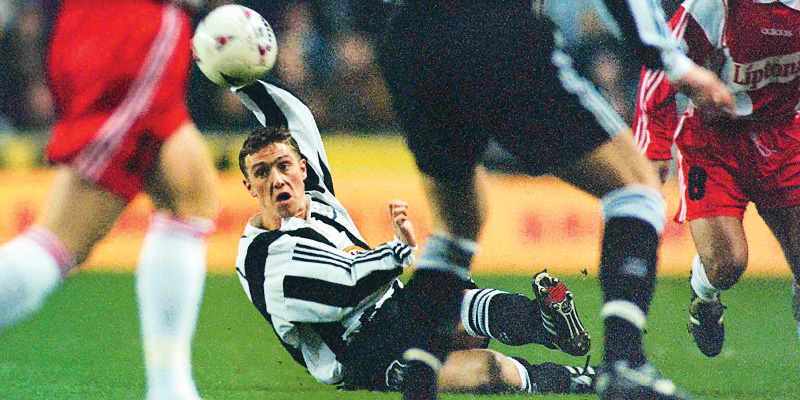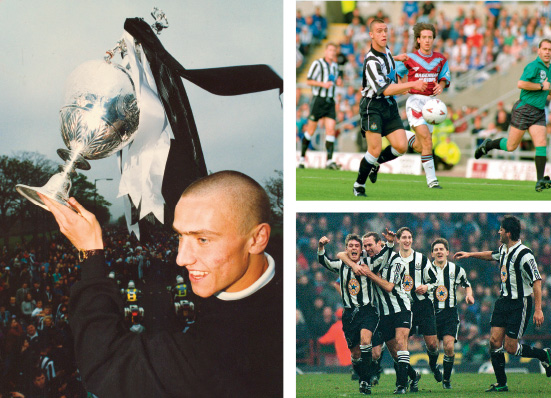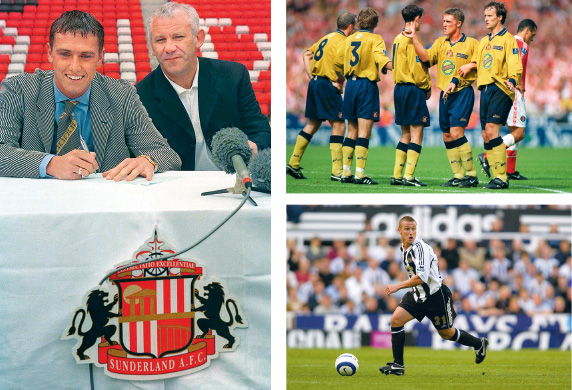
Lee Clark tries to keep the ball in play as Newcastle United are defeated by Monaco in the UEFA Cup Quarter final at St James’ Park. Alamy
After playing a key role in Kevin Keegan’s promotion-winning Newcastle side, the midfielder repeated the trick with Sunderland – before things turned sour
By Ffion Thomas
28 November 2022
Born in Wallsend on North Tyneside, by the age of 15 Lee Clark had signed for his boyhood club Newcastle United and scored a hat-trick at Wembley, for England schoolboys in 1988. His professional debut came two years later with Newcastle mid-table in the second tier. By the 1991-92 season he had fully established himself in their midfield but they faced a relegation battle under Ossie Ardiles and later Kevin Keegan, only surviving the drop on the final day.
It marked a turning point. With the redevelopment of St James’ Park as a backdrop to the final months of the season Clark was ever-present in 1992-93, winning player of the season as Newcastle won the title by eight points. Back in the top tier after four years away, Keegan’s side finished third. Clark missed the end of that season and much of their swashbuckling start to 1994-95 through injury, but having topped the table until mid-November they fell away and eventually finished in sixth.

Lee Clark with the First Division trophy in May 1993; playing the ball through against West Ham in the Premier League; celebrating scoring against Aston Villa. Alamy (3)
Newcastle invested heavily that summer and once again stormed to the top with nine wins from ten, Clark scoring in the 6-1 demolition of Wimbledon. In mid-February they were nine points clear of Manchester United with a game in hand, but Clark was dropped in favour of David Batty when the teams met in early March and an Eric Cantona goal ended Newcastle’s perfect home record. He didn’t return until the final four games, by which time Alex Ferguson’s side led the table and saw out the title.
Having licked their wounds with the £15 million purchase of Alan Shearer, Newcastle recovered from a poor start to keep in touching distance of the title race. But Keegan resigned in January, Clark scoring in the first game after his departure, a 2-2 draw at Villa Park that left Newcastle five points off the top. Kenny Dalglish took charge as they lost to Monaco in the UEFA Cup quarter-final and eventually finished second.
In the summer of 1997 Clark crossed the Tyne-Wear divide to join Sunderland under Peter Reid, playing every game and scoring 13 goals as they finished third and lost a thrilling play-off final to Charlton on penalties. They made up for it the following season, cruising to the Division One title with a then record points total of 105 having lost just three games. A couple of weeks after lifting the trophy he attended the FA Cup final between Newcastle and Manchester United with friends and was photographed wearing a T-shirt bearing the anti-Sunderland slogan “Sad Mackem Bastards”. The club’s record signing was swiftly put on the transfer list: “My first priority must lie with the fans,” said Reid.

Lee Clark signs for Sunderland alongside manager Peter Reid in 1997; during the Black Cats’ play-off final defeat to Charlton Athletic; back at Newcastle in 2005. Alamy (3)
First Division Fulham snapped up Clark and he went on to star in their title-winning 2000-01 campaign, but the rest of his time at Craven Cottage was hampered by injury; though Fulham and Sunderland were both in the Premier League in the 2001-02 and 2002-03 seasons, Clark missed all four games. In 2005 the 32-year-old returned to Newcastle, ostensibly to play for and assist with coaching the reserves, but was soon called upon and ended up making 24 first-team appearances; he was predictably booed at the Stadium of Light as Newcastle won both derbies.
At the season’s end he returned his focus to the dugout with a coaching role at St James’ Park, beginning a managerial career that would take in Huddersfield, Birmingham, Blackpool, Kilmarnock, Bury and Blyth Spartans, as well as spells in Sudan and Oman.
This article first appeared in WSC 426, November/December 2022. Subscribers get free access to the complete WSC digital archive
Want to see your writing published in WSC? Take a look at our pitching guide and get in touch
Tags: Focus On, Lee Clark, Newcastle United, Sunderland
